Feb 3, 2013 at 1:59pm ET by Vanessa Fox From: http://searchengineland.com
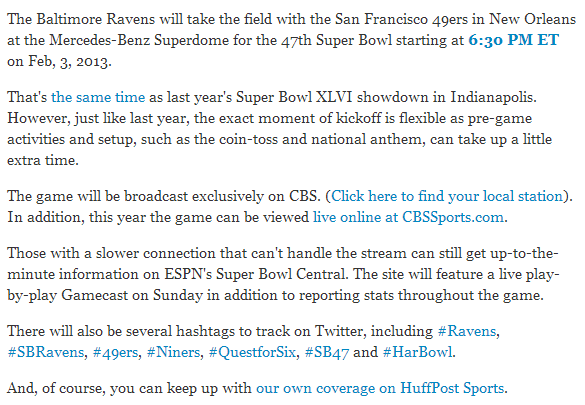
Surely every organization managing an event site knows at this point that people want to know what time things start. And that those potential viewers are likely to turn to Google to find out.
This year, Google just provides the answer right at the top of the page: February 3rd at 3:30 pacific.
Just as we saw last year, the NFL understands what their target audience is looking for and has built a page that provides exactly what they need (that ranks first in the search results), as well as invites them to tour the rest of the site (which gives the NFL the page views they need – win/win!).
Super Bowl Start Time: Search Results Through the Years
This query is a great example of how far search has come (both for search engines and for organizations who want to reach their audiences online). Let’s take a quick journey back in time.
2009 Super Bowl - Google offers up the 2007 game (and Microsoft Live Search provides a Wikipedia result about the history of the Super Bowl).
2010 Super Bowl -Google attempts to fix the problem of choosing either spammy results or spammier results (“So when is the Super Bowl 44 start time? What is the Super Bowl Time? Football fans all over America would be anxious for the game to begin on 2010 Feb 07 at Land Shark Stadium, Miami, Florida. The Super Bowl 2010 start time is pretty well set…”) to rank by adding a Onebox with the start time at the top of the page. (Bing mostly just provides the spam.)
2011 Super Bowl – Google gives news organizations the benefit of the doubt, and puts Google News results above the Onebox that gives searchers the answer they are looking for.
Sadly, news organizations have decided that what works for churn and burn spam sites works for credible organizations with names that would hurt more to lose and thus began HuffPo’s tradition of crafting articles almost solely out of search queries (“Are you wondering, “what time does the Superbowl start?” It’s a common search query, as is “what time is the super bowl 2011″, “superbowl start time” and “superbowl kick off time 2011″, according to Google Trends the evening before the Super Bowl.”).
Bing is also ranking pages with wisdom like “But a whole bunch of people don’t even know when the Super Bowl starts. As of noon EST today, here are some of the most frequent Google searches, based on the Google Trends site…”
2012 Super Bowl – Everything changes, and the angels rejoice (or maybe that’s just me). Sure, HuffPo is still at it, and still ranking (“For starters, it’s two words, not one. “Superbowl” is an incorrect spelling”), and the Onebox on Google mysteriously goes missing, but the NFL creates a page that is intersection of target audience analysis and organization goals and builds it in such a way that it shows up for searchers.
By the way, that multiple spelling technique isn’t isn’t just a Super Bowl strategy for the Huffington Post. Take a look at this article about Kanye West’s fashion sense (“He had on a straitjacket (perhaps more commonly spelled “straight jacket”)…)”:
2013 Super Bowl – And this year, the NFL is once again meeting their audiences needs and Google has rewarded them by ranking them first. The Onebox is also back and above the news results this time. And Bing is also providing the start time at the top of results.
Who Should Be Ranking?
What about the organizations other than the NFL that should be ranking?
TV Guide
tvguide.com ranks for [what time does the super bowl start] but not for the slightly more popular [super bowl start time], which is a sign that Google still has work to do in truly ranking based on intent vs. the specific words in the query (and gives HuffPo a little ammunition in defending their choice to sneak in as many query variations as possible). I applaud TV Guide for understanding what their audience is looking for and providing answers, but they could probably do a better job of showcasing other content on the site that would appeal to this audience (right now, they include links in the article, but no images or video that would catch the viewer’s attention and encourage clicks.
CBS
The game airs on CBS this year, but their site isn’t ranking for this query. Amazingly, YOU CAN WATCH THE GAME ONLINE ON THE CBS WEB SITE THIS YEAR (finally, finally, we live in the future), but cbs.com doesn’t rank for those searches either.
My new favorite site, nfl.com, ranks for both (fortunately for CBS, they just link right over to cbs.com). What’s the problem? Same old story. The cbs.com home page links to just a pop up player with the live stream, and doesn’t have a real page available that search engines can index and rank. In fact, the only page on cbs.com that seems to mention the Super Bowl at all is the home page. And without JavaScript enabled, well, the page looks like this:
San Francisco 49ers
The home page does list the start time, but as with teams in years past, that this is the start time of the game can only be inferred. The actual words that people are looking for aren’t there.
Baltimore Ravens
To be honest, I can barely tell that from the Baltimore home page that they’re in the Super Bowl. Sure, they’ve got a hashtag, but this page looks designed for aesthetics rather than based on what users might want to accomplish.
So, it goes. In 2013, large organizations still don’t have the basics down and still aren’t connecting with their target audience as well as they could be. Knowing what a hashtag is just isn’t enough.
But things are definitely improving. The NFL is getting it right two years in a row. CBS is offering live streaming on your pick of devices. And the latest offering by the Huffington Post is actually about the game, and not an ode to Google Trends:

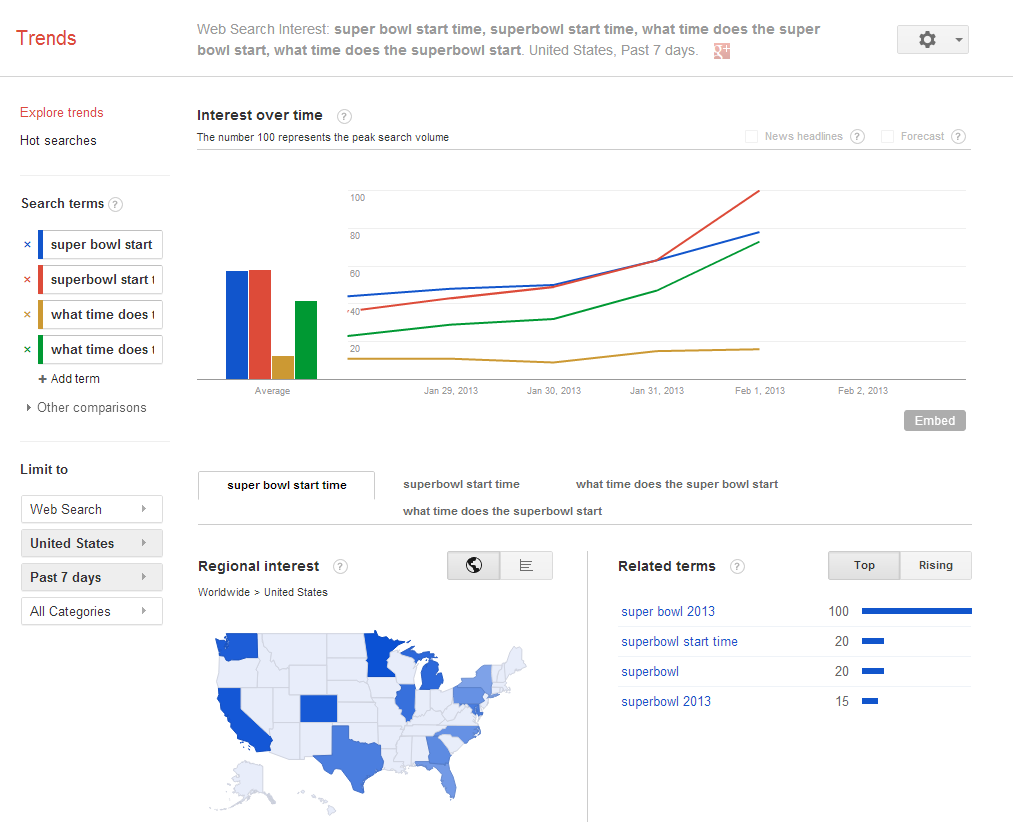
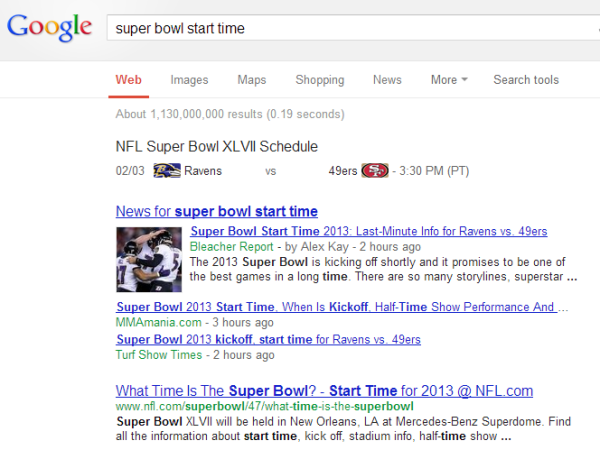

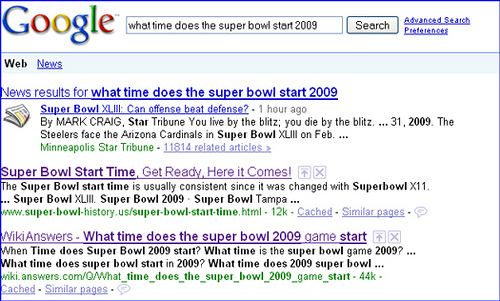






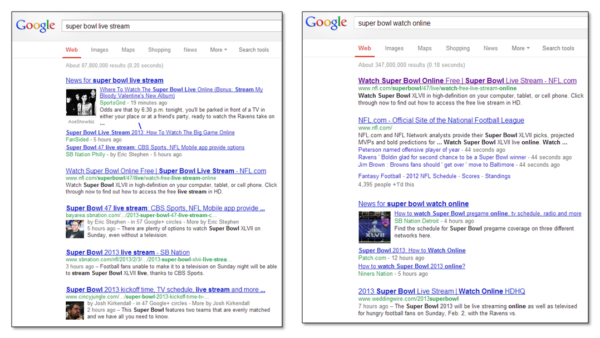
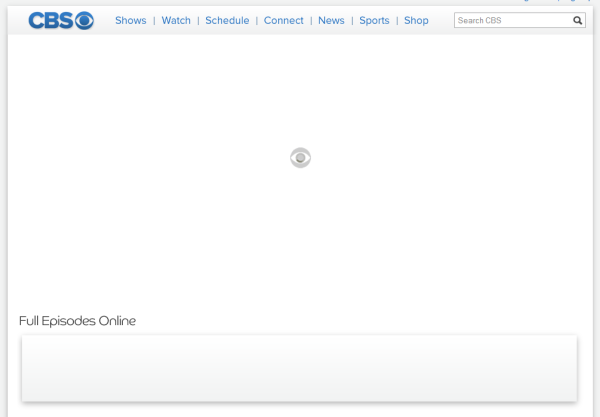


No comments:
Post a Comment